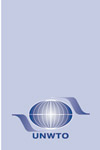 The tourism sector’s contribution to communities’ empowerment as one of the pillars of sustainable development was at the heart of this year’s World Tourism Day celebrations. The President of Mexico, Enrique Peña Nieto, opened the official celebrations of World Tourism Day held in Guadalajara, Mexico (27 September 2014).
The tourism sector’s contribution to communities’ empowerment as one of the pillars of sustainable development was at the heart of this year’s World Tourism Day celebrations. The President of Mexico, Enrique Peña Nieto, opened the official celebrations of World Tourism Day held in Guadalajara, Mexico (27 September 2014).
World Tourism Day (WTD) was celebrated this year under the theme “Tourism & Community Development“, highlighting the community dimension as one of the key pillars of sustainable development. Organized by UNWTO and the Government of Mexico, the official WTD celebrations took place in the city of Guadalajara (Jalisco) with the presence of President Peña Nieto, tourism ministers and private sector representatives from around the world.
Representing more than 8% of Mexico’s GDP and employing 7% of the national workforce, “this rapidly growing sector attracts investment and drives local and regional development, while providing opportunities for growth, particularly for women and youth”, said President Peña Nieto addressing WTD participants. “Tourism is a great social tool reducing inequalities and helping our communities to progress. Due to the potential of this activity, the government has identified tourism as a sector of major relevance”, he added.
In his WTD message, UN Secretary-General, Ban Ki-moon, said “This year´s observance of World Tourism Day focuses on the ability of tourism to fully empower people. Engaging local populations in tourism development builds stronger and more resilient communities. Tourism helps people to develop a variety of skills. As a service sector with cross-cutting impact on agriculture, construction or handicrafts, tourism creates millions of jobs and business opportunities. Its capacity to lift people from poverty, promote gender empowerment and help protect the environment has made it a vital tool for achieving positive change in communities across the world”.
UNWTO Secretary-General, Taleb Rifai highlighted that “there can be no real tourism development if it damages the values and culture of host communities, or if the socio-economic benefits generated by tourism do not trickle down to the community level. I would like to invite all tourism stakeholders and host communities to come together and celebrate this day as a symbol of our common efforts in making tourism a true pillar of community development and community development the basis of a more sustainable future.”
Among several activities, WTD brought together Ministers of Tourism from nine countries and the Organisation of Economic Co-operation and Development (OECD) at its high-level Think Tank.
Opening the event, the Secretary of Tourism of Mexico, Claudia Ruiz Massieu Salinas, underscored how her country’s policies support the socio-economic growth of local communities. ”Tourism is about people and we must ensure social inclusion. Governments come and go but communities don’t. Involving them in the decision process is critical for sustainability”, she said.
The Think Tank, moderated by Gabriela Frías, of UNWTO media partner CNN International, debated the key policy areas to support community participation for their empowerment and benefit from tourism, the role of the private sector, and the overall contribution to sustainable development supported by improved tourism policies, which must include communities in the decision making process.
Highlights include:
· Tourism can be a tool which allows communities to pursue development without losing their identity, while generating income and opportunities promoting local development, including in rural areas, fighting thus the migration to cities.
· A participatory approach is critical to ensure that communities, which are complex social structures, share the ownership of the tourism supply, turning tourism into a relevant tool for communities in both remote rural areas and cities.
· Participation improves local governance capacities while unlocking existing and potential tourism assets – including natural assets, tangible and intangible cultural heritage – and contributes to both protecting those assets and fostering community pride and social cohesion.
· Communities as partners in equal standing are able to ensure how to best channel private sector efforts for new tourism endeavors and necessary infrastructure investments which also benefit tourism development.
· While public tourism policy cannot pursue a one-size-fits-all approach, it must promote the importance of community development as a pillar of general development, a concept to be shared by all tourism stakeholders, including the private sector and tourists themselves.
Participants at the high-level Think Tank: Claudia Ruiz Massieu Salinas (Secretary of Tourism, Mexico), Eglantina Gjermeni (Minister of Urban Development and Tourism, Albania) Otmar E. Oduber (Minister of Tourism, Transportation and Labour, Aruba), Sandra Howard (Vice minister of Tourism, Colombia), Emilio Silvestri (Director of the Honduras Institute of Tourism, Honduras), Dato’ Seri Mohamed Nazri Abdul Aziz (Minister of Tourism and Culture, Malaysia), Mayra Salinas (Minister of Tourism and Executive President of the Nicaraguan Institute of Tourism), Marcela Bacigalupo (Executive Secretary of SENATUR, Paraguay), Magali Silva Velarde-Álvarez (Minister of Foreign Trade and Tourism, Peru) and Sergio Arzeni (Director, Centre for Entrepreneurship, SMEs and Local Development, OECD).
About World Tourism Day
World Tourism Day (WTD) is held annually on 27 September.
Its purpose is to foster awareness among the international community of the importance of tourism and its social, cultural, political and economic value. The event seeks to address global challenges outlined in the United Nations Millennium Development Goals (MDGs) and to highlight the contribution the tourism sector can make in reaching these goals.
Share your celebrations with us on our website and submit your photo of tourism and community development for inclusion in our Facebook album!
For more information please follow UNWTO on Facebook and Twitter.
